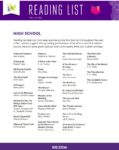Brown Bear, Brown Bear; Green Eggs and Ham; If You Give a Mouse a Cookie. No matter which bedtime story parents reach for, they’re hoping their children will develop a love for books and reading.
“Few children learn to love books by themselves,” notes Orville Prescott, in his book, A Father Reads to His Children. “Someone has to lure them into the wonderful world of the written word; someone has to show them the way.”
In addition to facilitating a love of literature, a 2015 study by John S. Hutton, MD, a clinical research fellow at Cincinnati Children’s Hospital Medical center, suggests that reading aloud to children has extensive long-term benefits.
The study, published in Pediatrics, looked at the brain function of 19 three- to five-year-olds. The children had various degrees of reading exposure at home. The results showed that higher reading exposure was positively associated with activation of brain areas supporting mental imagery and narrative comprehension.
Dr. Hutton explains this brain phenomenon. Reading activates a region of the left hemisphere of the brain called the parietal-occipital association cortex. This region of the brain is very active in older children as they create mental images from the words they are reading. Developing this skill at a young age helps them become better readers and stimulates creativity. Armed with this new research, pediatricians are re-emphasizing the importance of reading aloud to children.
Whitney Elkins, a kindergarten and first-grade teacher at Virginia Virtual Academy, notes that early reading is also critical to developing phonological awareness. “The beauty of this is that it’s not a skill that necessarily has to be taught. Oftentimes, it is developed just by soaking up the melody of a story, a poem, or a rhyme being read aloud. It’s not unlike learning a language.”
Elkins’ work with her students and their Learning Coaches extends beyond the classroom. When asked how parents can instill a love for reading in uninterested readers, her experience as a teacher and a mother shines through. “Working with emergent readers, I have seen time and again that the students whose parents describe as ‘never wanting to sit still long enough to listen to a book’ are the ones who struggle with learning how sounds relate to letters. As a mother, I know that children are active, but it’s our job to ‘lure them into that wonderful world of the written word.’”
Based on the study by Dr. Hutton, and Mrs. Elkin’s expertise, it is abundantly clear that the benefits of early childhood reading are numerous. Parents, no matter what you are reaching for from that bookshelf before bedtime, just keep reaching!





































